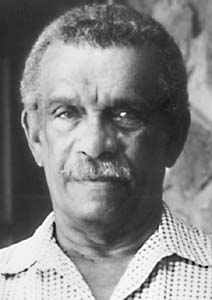![[Metroactive Arts]](/arts/gifs/art468.gif)
[ Arts Index | San Jose | Metroactive Central | Archives ]
 Word Power: Nobel laureate Derek Walcott is just one of many distinguished guest creators at the Intersections series.
Word Power: Nobel laureate Derek Walcott is just one of many distinguished guest creators at the Intersections series.
Crossing Lines Poets, novelists and musicians collaborate at museum's 'Intersections' series By Louise Brooks IN MAY AND JUNE, words will meet music without a plan. The audience at the San José Repertory Theater will sit back and listen to musicians carry sound through the style we know as jazz, and past it, making label-less music, improvised and punctuated with poets' words. For the third year running, the San Jose Museum of Art and acclaimed poet and Miles Davis biographer Quincy Troupe have organized a promising Monday-night performance series titled "Intersections III: Five Nights of Literature and Music." The series will bring together some of America's most talented poets and novelists, as well as some of our most innovative jazz musicians and composers. Amiri Baraka, Adrienne Rich, Nobel Prize winner Derek Walcott and Maxine Hong Kingston are just a few of the writers who will be appearing in programs along with jazz greats such as Muhal Richard Abrams, Hamiet Bluiett, Henry Threadgill and John Hicks. The series is on offshoot of Troupe's longer-running "Artists on the Cutting Edge" series in San Diego. Troupe's concept is simple: He tries to line up a poet, a novelist and a musician to share each night's program. He strives to have a mix of men and women, and a mix of ethnicities--"styles that might seem opposite," he tells me, "but converge in some way." Troupe gives each artist 30 minutes of space to do with whatever he or she wants. Oftentimes, the artists choose to collaborate on improvised pieces. "For example, last year, I brought Danny Glover," Troupe says, "because he's one of the only people who read Langston Hughes, and I think it's important to keep certain writers in front of people. So when he was there, he heard Charles MacPherson play, and he knew his music, so he asked him downstairs, 'Man, would you play behind me?' and Charles said, 'Yeah!' And then MacPherson's son, who is also a great drummer and plays with his father, said, 'Can I play, too?' and he said, 'Yeah!' So they came out there and did this thing together; it was marvelous. So this happens a lot." TROUPE'S MIXING of genders and ethnicities is more than a good-hearted attempt at equal opportunity; it is a studied effort to bring together the voices that emerge from different histories, allowing us to listen to how they resonate off of each other. "I'm trying to reflect this country," Troupe tells me. "I'm trying to reflect the way the culture of this country, the population of this country, is. I think this is the kind of dialogue we need on a constant basis to be reminded all the time that we have all these really fabulous artists and writers who have different histories." Troupe's not too keen on the "melting pot" image of America. He prefers a salad metaphor in which each ingredient retains its distinctive flavor but coexists with everything else in the bowl. "Everybody doesn't melt down into one thing," he explains. "That's not the way it is. It's not going to ever be like that. Up on that stage, on each individual night, the audience, which is America, comes face to face with itself, with the artist as the mirror, reflecting back similar concerns or dissimilar concerns. I think that is something that can only give us a better, deeper humanity." The musicians, as much as the writers, bring their histories into their performances during Intersections. Some of the musicians playing, such as pianist/composer Muhal Richard Abrams and trombonist/composer George Lewis, have focused much of their careers on improvised music. "Improvised music comes out of personal and social histories," George Lewis explains. "Instead of preimposing a framework, the structures emerge from the piece. What one listens for, as a listener, is how these structures merge, and how one, as a listener, might empathize with the musicians." According to Abrams, "All folk societies, all over the world, in their basic folk music have a form of improvisation that applies to that particular folk music. Before any folk music was formalized, or placed in academia, people tended to make the sort of musical situation that they wanted for their own purposes, whether for healing, or whatever." Both Abrams and Lewis point out that the form of improvisation that they work with and bring to any musical gathering comes straight out of the African American tradition. Lewis, who teaches at UC-San Diego, finds himself constantly "dialoguing" in musical situations with other traditions, other forms of improvisation. Just as with the writers, our role as audience for these musicians is to listen for "similar or dissimilar concerns," to listen for the history that is informing their playing, and to experience moments both of discomfort and of empathy. Abrams reminds me that the "highest function" of music and literature "has to do with more than entertainment. It's all intended for the uplifting and enlightening of humanity. Improvisation plays a great role in that."
Intersections III takes place May 21, 28 and June 4, 11 and 18 at 7:30pm at the San José Repertory Theater, 101 Paseo de San Antonio, San Jose. Tickets are $20 museum members/$25 general. (408.271.6840 or sjma.com) The first program features Nobel laureate poet Derek Walcott, Latino poet Victor Hernandez Cruz and jazz sax player Arthur Blythe. Check the Metro Calendar each week for details on upcoming programs. [ San Jose | Metroactive Central | Archives ]
|
From the May 17-23, 2001 issue of Metro, Silicon Valley's Weekly Newspaper.
Copyright © 2001 Metro Publishing Inc. Metroactive is affiliated with the Boulevards Network.
For more information about the San Jose/Silicon Valley area, visit sanjose.com.